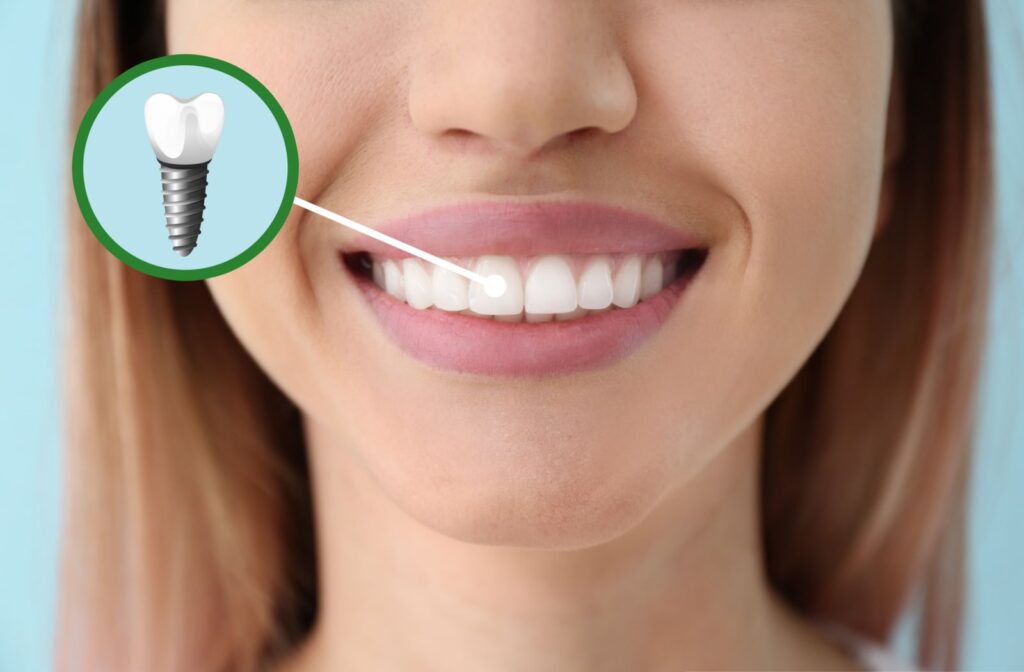Can You Replace All Of Your Teeth With Implants?
Your dentist will likely recommend dental implants when you have a damaged tooth. They are long-lasting artificial teeth that help to replace missing or damaged teeth. However, what if you have more than one tooth with a problem? Can you replace all of your teeth with implants?
It is possible to replace all of your teeth with implants by using something called the “all-in-4” approach. Four posts are installed throughout the jawbone, and then a partial or full arch of artificial teeth can be attached. This lets you replace several teeth at once without needing an overly complex surgery to replace every tooth.
What Are Dental Implants?
Dental implants are a convenient and modern solution to missing, damaged, or diseased teeth. They are artificial teeth designed to replace a tooth with an artificial replacement. There are 3 parts to these implants:
- The implant itself is a titanium post surgically implanted into the jawbone underneath your gumline and acts as an anchor for the rest of the artificial tooth
- The abutment helps hold the fake tooth to the implant
- The dental crown acts and looks like a natural tooth
Together, these parts make up a complete replacement for a tooth. These dental implants look and feel natural and are extremely long-lasting. They are an excellent approach to treating plenty of different dental problems!
When Should You Get a Dental Implant?
Your dentist may recommend a dental implant for several different situations. Typically, they will advise an implant for conditions like:
- Significant tooth decay that cannot be repaired with a traditional filling or crown
- A single tooth or multiple teeth missing that affect your ability to chew or speak properly
- When a tooth extraction is unavoidable due to damage or periodontal disease
- A more permanent solution to a dental bridge or removable dentures
Almost any tooth requiring extraction can be finished with a dental implant. The implants can sometimes be installed immediately after tooth extraction, simplifying the healing process and eliminating the need for a second surgery. However, in most cases, your dentist will recommend spacing these appointments apart so your jaw can properly heal.

Alternatives to Dental Implants
While dental implants can be extremely effective, they are not always recommended. To support an implant, your jaw must be strong enough to bond properly with the bone. If your jaw is not strong enough, your dentist may suggest alternative treatments such as:
- Dental bridges: This is where an artificial tooth is anchored between 2 surrounding teeth
- Dentures: These are removable replacement teeth that can come in partial or full sets.
Your dentist may recommend these if you have severe gum disease, tooth damage, or bone loss in the jaw. This is why it is important to schedule a consultation appointment with your dentist; they will be able to assess your oral health to determine an appropriate treatment for your problem.
How Many Dental Implants Can You Get?
So, a big question remains: how many implants can you get? What if you have several damaged teeth?
There’s good news! If necessary, your dentist can replace every one of your teeth with an implant. The amount of implants you will need will depend on your specific situation. While replacing an entire arch of teeth is possible, it is not always recommended.
Your dentist will likely recommend replacing the damaged tooth for a single-tooth replacement. However, if you have several damaged or missing teeth or are at risk of losing an entire arch, your dentist may recommend an approach called the “all-in-4 dental implant.”
All-In-4 Dental Implants
Remember, when getting a dental implant, the surgeon must place the titanium post in the jawbone. If you are replacing more than a few teeth, that is a lot of posts—it would be an extreme amount of stress on the jaw and likely cause a great deal of damage.
So, instead, the all-in-4 approach helps when replacing more than a few teeth. With this treatment, your surgeon will implant 4 titanium posts through one jaw arch. They will space it out appropriately where the bone is strong. Then, a full or partial arch of teeth is attached, just like a normal crown. The posts hold this arch, and you have your replacement teeth.
It is important to note that while these methods provide a significant upgrade over traditional dentures, they also require adequate bone volume and density to support the implants. If your jaw is not strong enough, your dentist may need to perform a bone graft to help supplement the strain of supporting a full arch of artificial teeth.
Tips for Caring for Your Dental Implants
Once you have your dental implants installed, it is natural to wonder how to care for them. Fortunately, it is much simpler than you might think; treat them like natural teeth!
Make sure that you:
- Brush your teeth 2 times a day for 2 minutes at a time
- Floss regularly
- Use mouthwash once a day
- Rinse your mouth after eating
Your dentist may recommend special brushes or floss if necessary. When recovering, follow their instructions to the letter—this can help lower the risk of developing a post-surgery complication or infection.
If you ever notice anything unusual with your implant, schedule an appointment with your dentist. While implants can be a long-lasting approach to treating missing or damaged teeth, they are not invincible and can be damaged. Fortunately, your dentist can help.
Do You Need Dental Implants?
If you have a missing tooth, damaged teeth, or any other irregularity, visit our Dentistry on Danforth team. We can check your dental health to help you find treatment and relief. Do not leave dental problems unaddressed; request an appointment with our team today!


